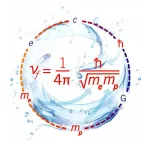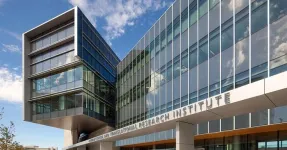(Press-News.org) Researchers from Queen Mary University of London have made a discovery that could change our understanding of the universe. In their study published in Science Advances, they reveal, for the first time, that there is a range in which fundamental constants can vary, allowing for the viscosity needed for life processes to occur within and between living cells. This is an important piece of the puzzle in determining where these constants come from and how they impact life as we know it.
In 2020, the same team found that the viscosity of liquids is determined by fundamental physical constants, setting a limit on how runny a liquid can be. Now this result is taken into the realm of life sciences.
Fundamental physical constants shape the fabric of the universe we live in. Physical constants are quantities with a value that is generally believed to be both universal in nature and to remain unchanged over time – for example the mass of the electron. They govern nuclear reactions and can lead to the formation of molecular structures essential to life, but their origin is unknown. This research might bring scientists one step closer to determining where these constants come from.
“Understanding how water flows in a cup turns out to be closely related to the grand challenge to figure out fundamental constants. Life processes in and between living cells require motion and it is viscosity that sets the properties of this motion. If fundamental constants change, viscosity would change too impacting life as we know it. For example, if water was as viscous as tar life would not exist in its current form or not exist at all. This applies beyond water, so all life forms using the liquid state to function would be affected.”
“Any change in fundamental constants including an increase or decrease would be equally bad news for flow and for liquid-based life. We expect the window to be quite narrow: for example, viscosity of our blood would become too thick or too thin for body functioning with only a few per cent change of some fundamental constants such as the Planck constant or electron charge.” Professor of Physics Kostya Trachenko said.
Surprisingly, the fundamental constants were thought to be tuned billions of years ago to produce heavy nuclei in stars and back then life as we know it today didn’t exist. There was no need for these constants to be fine-tuned at that point to also enable cellular life billions of years later, and yet these constants turn out to be bio-friendly to flow in and between living cells.
An accompanying conjecture is that multiple tunings may have been involved and this then suggests a similarity to biological evolution where traits were acquired independently. Through evolutionary mechanisms, fundamental constants may be the result of nature arriving at sustainable physical structures. It remains to be seen how the principles of evolution can be helpful to understand the origin of fundamental constants.
END
How a cup of water can unlock the secrets of our Universe
2023-08-23
ELSE PRESS RELEASES FROM THIS DATE:
How neurons grow comfortable in their own skin
2023-08-23
Nerve cells that sense touch grow the appropriate endings for hairy or hairless skin based on cues from the skin itself, rather than through predetermined programming, according to research led by Harvard Medical School scientists and published Aug. 21 in Developmental Cell.
If affirmed in further studies, the findings could eventually help researchers develop therapies to regenerate damaged or diseased nerves, the authors say, or better understand what goes awry in congenital neuropathies, conditions in individuals born with ...
A better understanding of myalgic encephalomyelitis/chronic fatigue syndrome could benefit long COVID patients
2023-08-23
Amsterdam, August 23, 2023 – While myalgic encephalomyelitis/chronic fatigue syndrome (ME/CFS) and Long COVID are not the same disease, they appear to have features of overlapping biological and symptomatic presentations. Many people with Long COVID meet the diagnostic criteria of ME/CFS. Long COVID scientists and clinicians could expedite research and care protocols by utilizing information and experiences gained from the ME/CFS community. A special section of WORK: A Journal of Prevention, Assessment & Rehabilitation aims to provide a ...
Insights from fully sequencing 43 human Y chromosomes
2023-08-23
Highly challenging to sequence and long overlooked, the human Y chromosome’s contributions to health and disease remain largely unknown. A new paper that presents, for the first time, the complete sequences of multiple human Y chromosomes from lineages from around the globe provides an essential step forward in understanding the roles of the Y chromosome in human evolution and biology.
Even as the field of human genomics forged ahead at an astonishing pace, the Y chromosome— one of the ...
Interdisciplinary Lehigh University team awarded NSF grant to train future energy leaders
2023-08-23
A team of interdisciplinary researchers led by Arindam Banerjee, professor and chair of the Mechanical Engineering and Mechanics Department at Lehigh University, has been awarded nearly $3 million from the National Science Foundation to train a diverse group of future energy-sector leaders across academia, industry, government and policy organizations.
The five-year award will allow Lehigh to establish a SEED (Stakeholder Engaged, Equitable, Decarbonized) Energy Futures Training Program to provide graduate students with the skills needed to explore, collaborate and pioneer solutions to the society’s reliance on carbon-based energy sources and energy inequities. ...
Carnegie Mellon University announces new Director of the Language Technologies Institute
2023-08-23
Mona Diab understands what is at stake.
As a research scientist at two of the largest technology companies on the planet, Diab saw the impact innovations had as they spread across the globe. And with artificial intelligence poised to usher in the greatest technological leap since the internet, Diab wants to train, teach and prepare students, researchers, scientists and communities to think responsibly about these new tools.
"We're living in a world of proliferating AI and generative AI. There ...
Planning algorithm enables high-performance flight
2023-08-23
A tailsitter is a fixed-wing aircraft that takes off and lands vertically (it sits on its tail on the landing pad), and then tilts horizontally for forward flight. Faster and more efficient than quadcopter drones, these versatile aircraft can fly over a large area like an airplane but also hover like a helicopter, making them well-suited for tasks like search-and-rescue or parcel delivery.
MIT researchers have developed new algorithms for trajectory planning and control of a tailsitter that take advantage of the maneuverability and versatility of this type of aircraft. Their algorithms ...
Clinical trial studying possible new treatment option for patients with NAFLD
2023-08-23
According to the National Institutes of Health, approximately 24% of adults in the United States have nonalcoholic fatty liver disease (NAFLD), an umbrella term for a range of liver conditions affecting people who drink little to no alcohol that can lead to cirrhosis, liver cancer and liver failure.
Currently, there are no medications approved by the U.S. Food and Drug Administration (FDA) to treat NAFLD.
A recent $9.57 million grant awarded to researchers with the UC San Diego NAFLD Research Center at University of California San Diego School of Medicine will support a clinical trial to study a new treatment option for patients ...
National estimates of gender-affirming surgery
2023-08-23
About The Study: In this study of 48,000 patients, gender-affirming surgery increased significantly in the U.S., nearly tripling from 2016 to 2019. Breast and chest surgery was the most common class of procedures performed overall. The number of genital surgical procedures performed increased with increasing age.
Authors: Jason D. Wright, M.D., of the Columbia University College of Physicians and Surgeons in New York, is the corresponding author.
To access the embargoed study: Visit our For The Media website at this link https://media.jamanetwork.com/
(doi:10.1001/jamanetworkopen.2023.30348)
Editor’s ...
Health claims and doses of fish oil supplements
2023-08-23
About The Study: The results of this study suggest that the majority of fish oil supplement labels make health claims, usually in the form of structure/function claims, that imply a health benefit across a variety of organ systems despite a lack of trial data showing efficacy. Significant heterogeneity exists in the daily dose of eicosapentaenoic acid + docosahexaenoic acid in available supplements, leading to potential variability in safety and efficacy between supplements.
Authors: Ann Marie Navar, M.D., ...
Study: Atmospheric circulation weakens following volcanic eruptions
2023-08-23
The Pacific Ocean covers 32% of Earth’s surface area, more than all the land combined. Unsurprisingly, its activity affects conditions around the globe.
Periodic variations in the ocean’s water temperature and winds, called the El Niño–Southern Oscillation, are a major meteorologic force. Scientists know that human activity is affecting this system, but are still determining the extent. A new study in Nature has revealed that the atmospheric component of this system — ...







